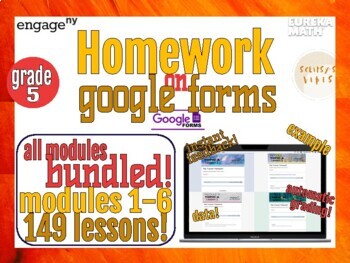Eureka Math/EngageNY Homework on Google Forms Grade 5, Modules 1 - 6 BUNDLE
- PDF
What educators are saying
Description
HUGE 5th Grade Problem Sets Bundle!
- Discount $20 off when you buy the bundle!
Homework on Google Forms
Modules 1 thru 6
All Topics
149 Lessons
Engage NY
Eureka Math
Student Homework transformed into Google Forms
- Great previews on individual module pages! Links below
What you're getting: Grade 5 All Modules 1 through 6 Homework on Google Forms from the student Homework Pages out of Eureka Math/EngageNY. embarc.online
Module 1 has 16 lessons
Module 2 has 29 lessons
Module 3 has 16 lessons
Module 4 has 33 lessons
Module 5 has 21 lessons
Module 6 has 34 lessons
You're getting 149 Forms in this HUGE bundle.
The Homework problems are almost identical to the Problem Set problems, with different numbers, of course, from the same lesson. Some Problem Set lessons are meant to be teacher-directed inside the Concept Development lesson for that day, so giving the homework form is a really easy way to check to see if students can solve the problems from today's math lesson and Problem Set on their own. You'll get instant feedback from automatic grading, to check understanding before moving on to the next lesson.
Problems are exactly the same as the Homework Lessons from EngageNY/Eureka Math. I did not create the problems, just transformed them into a virtual format. Each problem is grouped into appealing sections on the form.
Digital Google Forms are great for differentiating, great for students home, sick for that day's lesson (Distance Learning), and great for subs.
Problems with one answer will be graded automatically. Problems that require an explanation or if answers vary will need to be graded by the teacher, but are still great to have all in one place.
These Forms can be edited. You can delete problems you don't wish your students to do, duplicate problems you want them to do more of, add answer feedback, allow them to be taken more than once or only once. Or if you don't like the format I chose, you can create your own by changing any part of the form. You can edit all of these things before sharing the link with your students. Contact me, and I would love to help show you how to do any of this.
I suggest/recommend posting the new Homework lesson link each day in a google classroom, or on Canvas. If students are not understanding the concept, you can regive the Form again and again.





